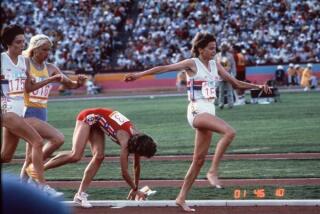U.S. Olympic Women’s Marathon Trials : Margaret Groos Wins in 2:29:50; Ditz Second
- Share via
PITTSBURGH — Margaret Groos, a former University of Virginia All-American who all but gave up competitive running a couple years ago because of medical problems, sprinted to victory Sunday in the U.S. Women’s Olympic Marathon Trial in the best time run by an American woman in 2 1/2 years.
With five miles left in the Pittsburgh Marathon, Groos, from Nashville, pulled away from Nancy Ditz to win in 2:29:50. Ditz, of Woodside, Calif., came along 24 seconds later. Cathy Schiro O’Brien of Boston finished third, four seconds behind Ditz.
The three top finishers each won a spot on the U.S. Olympic team and $25,000.
“I can’t believe we’re getting paid to go to the Olympics,” said Ditz, who left her job as a television feature reporter in San Francisco to train for this race.
Groos, who last ran a marathon in 1984, when she finished fifth at the last Olympic trial, said she was “stunned” by her performance. This was just the third marathon of her life. She began training for this race in January. And yet she was in such control of the race--and herself--that she said she felt “fantastic” when she sprinted to the end.
Her performance was a badly needed shot in the arm for U.S. women marathon runners, who have not found a star to replace the injured Joan Benoit Samuelson. It was the first sub-2:30 marathon run by a U.S. woman since Samuelson ran 2:21:21 Oct. 20, 1985. Groos became just the fourth American woman to run a sub-2:30 marathon.
What’s more, this was the first time ever that three U.S. women ran the marathon in under 2:31 in the same year, much less the same race.
“All the articles you read say, ‘Where are the Americans?’ ” said Lisa Weidenbach, the fourth-place finisher in the 1984 trials and the fourth-place finisher Sunday. “Well, they’re here.”
Groos (pronounced Gross) followed a lonely, twisting path to get to this day. She left Virginia with a degree in biology in 1982, eager to compete internationally on the track and the roads. But she didn’t realize that her best years, at least before Sunday, were behind her.
After the close call at the ’84 trials, she began to lose weight, about 10 pounds in a month. Her heart rate jumped to 100 beats per minute at rest; 250 beats per minute when she tried to run.
“I couldn’t run a mile in eight minutes,” Groos said. She ran 26 of them in an average of less than six minutes Sunday.
Nearly a year later, she was diagnosed as having a thyroid problem, but before the trouble was corrected, her weight jumped from 115 to 145. (She now weighs 120.) Only in the last 18 months has Groos, 28, been able to run consistently and, even now, she undergoes periodic blood tests.
For the first 17 miles Sunday, Groos watched the race unfold from a pack behind jack-rabbit leader Sylvia Mosqueda, a 21-year-old Cal State L.A. track star from Alhambra who built a remarkable 1 1/2-minute lead in the first five miles. Groos and the others completely lost sight of Mosqueda along some stretches of the hilly, tree-lined course. But they were not concerned.
“We knew Sylvia would go out fast,” Ditz said. “I had absolute confidence we would catch her.”
At about 15 miles, Groos and Ditz were within 100 yards of Mosqueda. At the 17 1/2-mile mark, Ditz and Groos passed Mosqueda, who was running especially hard and looking quite exhausted. Within a city block or two, Mosqueda was fifth. When she reached 18 miles, she quit running.
More to Read
Go beyond the scoreboard
Get the latest on L.A.'s teams in the daily Sports Report newsletter.
You may occasionally receive promotional content from the Los Angeles Times.






